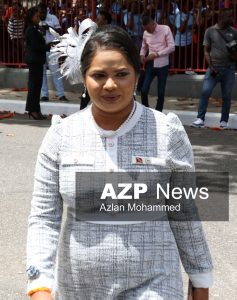ALL political parties registered with the Election and Boundaries Commission (EBC) will be given State funding.
And an Office of the Registrar of Political Parties will be established.
These are just two of the reform proposed in the Representation of the People (Amendment) Bill, 2020.
In an address in the Lower House on Friday, Prime Minister Dr Keith Rowley committed to campaign finance reform.
See Dr Rowley’s full text of his address:
Madam Speaker, with the authority of the Cabinet, I make the following statement on the much anticipated Representation of the People (Amendment) Bill, 2020.
Madam Speaker, upon entering Office as Prime Minister, I made a solid commitment to the people of this nation that Campaign Finance Reform legislation will be brought to the Parliament. Historically successive governments have only spoken on this issue of reform. Today, it brings me great satisfaction to inform this august House that my Government, unlike any other Government before us, has the fortitude to fulfill this promise of presenting legislation to address the issue of campaign finance.
It has been a long journey for the country, one that is still some ways from completion, but today a very significant and giant step is being made. Madam Speaker, for me it began early in my tenure as Opposition Leader when as Leader of the PNM, I was the only political representative of this nation who accepted the invitation of the OAS to attend a working meeting on this issue in Jamaica.
All Governments and Opposition parties in CARICOM were invited to receive and critique the OAS draft law on campaign finance reform. The meeting was very well attended but sadly only the PNM, in Opposition represented this country. The ruling party and its many coalition partners were unavailable because they had to celebrate the anniversary of their wonderful 2010 victory at a grand event for this purpose, in Tobago.
There was a follow up OAS meeting in Barbados and once again the PNM was present, this time represented by Mr Ashton Forde, the General Secretary of the Movement. This issue of campaign Finance Reform was seen as a priority for the OAS and the organisation kept pushing political entities to embrace the assignment in the hope of getting a regional agreement on a common widely acceptable piece of legislation. Subsequent to the Barbados meeting the OAS staff came to Trinidad to try and encourage the authorities here to host a meeting on the subject, in furtherance of the effort, but could not interest the then Government in participating or hosting such a regional or national event.
As Opposition Leader then I promised the OAS to keep the issue alive and today it is my first duty to sincerely thank the Attorney General and his very dedicated and hard-working staff for sticking tirelessly to the task of researching and drafting the elements of this very prickly subject in search of something we can all chew upon if only as guide to modernisation of an ancient legislative construct required to clean up our campaigns and protect as well as embellish our democracy.
Madam Speaker, this Bill when passed, after an appropriate period of public consultation, will represent a new era in our political history. It is part of this Government’s anti-crime plan, it is tied to the objectives of our public procurement legislation and it underscores our strategic focus on brazenly tackling money laundering, fraud, corruption and rampant criminality in this country.
Madam Speaker, the current law governing this issue is rooted in antiquated provisions of the Representation of the People Act of 1967, which merely provides a simplistic framework for accountability of a candidate’s funding. The law bears no resemblance to more progressive legislative reforms in many other countries and is replete with inadequacies.
The current law does not formally recognise political parties as distinct legal entities that can compete against each other in elections and instead provides for political parties to apply to the EBC to use a symbol for all its candidates. The financial expenditure reporting requirement under the existing Act applies to the party’s candidates and independent candidates only. Political parties are not so obliged. The scrutiny therefore, as provided in the current law, is on the candidate rather than the political party itself.
The current law does not facilitate or effectively cater for mergers and coalitions of political parties. It does not oblige political parties, coalitions or merged political parties to disclose and account for their full campaign expenditures to the EBC or any regulatory body. It also impractically, even laughably, limits campaign expenditure to fifty $50,000 in the case of a Parliamentary election.
The current law does not regulate the role and impact of the media during an election campaign by political parties. The present laissez faire system operates freely to meet the demands of those able to afford media costs. The reality is that not all political parties and candidates have fair and equitable access to the media for their political campaigns.
The current law does not provide alternative sources of funding, such as public funding, to even the playing field for all interested in political office to present their unique political messages to voters.
The current law does not punish political parties for the misuse and misapplication of funding which creates the opportunity for corruption and money laundering. It does not place an obligation upon financiers of political parties and candidates to disclose the fact of their contributions to the public. This silence is an underlying reason for the public’s general distrust as to the ‘true’ purpose of financial contributions. In many countries financiers have been accused of contributing to election campaigns for the sole purpose of unfairly benefitting from a reciprocal arrangement with successful candidates.
The current law does not regulate an incumbent government’s access to state resources before and during an election campaign period. This loophole allows an opportunity to supplement a candidate’s resources with State resources.
Madam Speaker, this PNM Government recognises that political parties and candidates are consumers of a global multi-billion dollar political marketing industry. Within this industry there are pollsters, market researchers, public relations consultants, technical advisers and communication specialists. These players offer a range of services designed to access the voter pool; to establish and promote a political brand that attracts voters; to craft political messages; to conduct strategic attacks on the image of opposing parties and candidates and most importantly – to sway the voters’ choice. Political parties and candidates place great value in investing in campaign strategies to present themselves as competent, potential representatives to their electorate in this Honourable Parliament.
But Madam Speaker, we must exercise great caution in order to safeguard our democracy. We simply cannot afford another Cambridge Analytica scandal where Trinidad and Tobago was identified internationally as the epicentre and ground zero starting point of neo-colonial socio-political manipulation through illegal data mining and micro-targeted political campaigning.
Imagine this kind of activity could have happened to such detriment but there was no requirement in law to record the actions of individuals or organisations and no accounting for the expenditure. This is the 21st Century and without the necessary appropriate reforms we are babes in the woods, exposed to the ravages of hungry wolves of home and abroad, wolves whose soiled lips are only prepared to scream “vindication” as they devour our innocence.
This country will recall the testimony of whistle-blower Christopher Wiley who admitted to a Committee of the House of Commons, United Kingdom, that the data acquisition in Trinidad and Tobago conducted in 2013 under the then UNC Government was illegal and that there was a total disregard for our law. He further stated that the standard Cambridge Analytica method is that you obtain a Government contract from the ruling party which funds the party’s political work. Whistle-blower Wiley went on to reveal in a published book the insider details of Cambridge Analytica’s data mining and psychological manipulation. This method of illegal data acquisition for the purpose of manipulating the electorate has caused Facebook to pay a record US$5bn penalty in the US for “deceiving” users about their ability to keep personal information private, after a year-long investigation into the Cambridge Analytica data breach. Cambridge Analytica upon being exposed quickly dissolved itself and has since filed for insolvency proceedings but its business models and its trainees are still flourishing in this the age of misinformation, fake news, data theft and manipulation.
Madam Speaker, this Government will do all in its power to prevent any recurrence of the abuse of our laws and abuse of the privacy of our citizens so as to ensure that a Cambridge Analytica fiasco is never repeated.
Madam Speaker, the Bill proposed by this Government adopts an egalitarian model of campaign finance laws. The objectives of egalitarianism are political equality, lowered campaigning costs, preserving integrity and credibility of the political system, ensuring transparency through disclosure, non-discrimination and equitable access to public funding. This egalitarian model is the premise of modern election laws of several countries, including the United Kingdom, Canada, New Zealand, Kenya, India, Jamaica and the Turks and Caicos Islands.
The Representation of the People (Amendment) Bill, 2020 encapsulates this progressive approach and is modelled upon the legislative scheme set out in Jamaica’s Representation of the People Act, amended in 2014 and 2016.
Madame Speaker, in formulating the proposed legislation, the Government had regard to observations of local stakeholders and international experts. Poignant views were found in a series of reports stemming from the early 1970’s, including the Wooding Commission on Constitutional Reform (1974), the Law Reform Commission’s ‘Preliminary Report on Political Parties and The Law, 2007’, the Joint Select Committee of the Parliament Appointed to Propose a Legislative Framework to Govern the Financing of Election Campaigns (2014), the Elections and Boundaries Commission policy paper on the ‘Registration of Political Parties and Public Campaign Financing, (2015)’ and wide stakeholder consultation conducted by the Ministry of the Attorney General and Legal Affairs in its Public Forum on Campaign Finance Reform in Trinidad and Tobago in 2016. Collectively these reports and consultations reiterated the need for legislation to regulate the varying aspects of modern election campaign financing.
The Bill proposes to expand the remit of the EBC by establishing a division to be known as the Office of the Registrar of Political Parties responsible for carrying out specified administrative functions and duties and establish a Register of Political Parties. The Bill will require any association or body of individual citizens of our country intending to be classed and operated as political parties, to apply to the EBC to be so registered and introduces a system of voluntary and involuntary de-registration of political parties. The Bill will also introduce a mechanism for merger and coalition arrangements between or amongst political parties.
Madam Speaker, the bill also proposes the imposition of a duty upon the Executive Officers of registered political parties to account for funding through audits, the filing of returns and the provision of statements of accounts. The bill proposes the regulation of the sources of donations and the process for receiving them. For this purpose, a National Election Campaign Fund will be established and a specified category of persons and entities would be permitted to contribute to a political party and candidate of their choice. This category will include all citizens of our country who are 18 years and older, citizens in diaspora abroad, trade unions, friendly societies, NPOs, building societies and domestic companies. Thus we provide members of the public with an opportunity to become actively involved in the democratic electoral process. We will however guard our elections by establishing a specified class of non-permissible donors such as foreign governments, agents of those governments, entities engaged in illegal activities and state bodies.
Madam Speaker, the Government recognises that citizens are entitled to donate to the political party or candidate of their choice. The Bill provides that donations made in excess of $50,000 shall be regarded as a tax deductible expense and must be publicly disclosed. Further, published information concerning such donations must clearly identify the donor, the nature and amount of that donation and the date the donation is made.
Madam Speaker, with regard to the critical issue of tendering for Government contracts, the Bill provides that where a person, company or other entity makes a contribution to a registered political party or a candidate, in excess of $50,000, and within two years before making the contribution, had entered into a Government contract having a contract value in excess of $2million it shall be declared to the Commission no later than fourteen 14 days after making the contribution. In addition, all registered political parties will be entitled to receive state funding. The EBC will be responsible for the administration of the system of allocation and payment of the funds from the Consolidated Fund.
Madam Speaker, the Bill also importantly provides for election advertisements which are a key tool utilised by political parties and candidates in educating the voting public. The Bill provides that advertisements can only be made by eligible promoters, that is, persons authorised by a registered political party or candidate to publish an election advertisement. Such advertisements must contain a statement setting out the name and address of the promoter.
Madam Speaker, this Government also recognises the importance of Regulations to accompany this law on Campaign Finance. The Bill therefore proposes to empower the Minister, on the recommendation of the Commission, to make Regulations generally for the better carrying out of the Act.
Madam Speaker, in addition to these commendable proposed reforms, the transitional provision in the Bill provides that a political party existing immediately before the commencement of this proposed law would be required to comply with the legislation within a specified time frame. Additionally, party symbols which existed immediately before the commencement of the legislation will be deemed as registered.
Madam Speaker, democracy and the rule of law are the lifeblood of our beloved nation. Proudly, history shows that we are a people unified in an objective that elections should be conducted freely and fairly. This PNM government knows that the citizens of this nation strive for such an environment.
Our elections present an opportunity for all citizens to actively and confidently participate in creating a representative democracy by campaigning for office and by the essential act of voting. Election campaign strategies are revolutionised. The modus operandi is money-driven, consultant-driven, advertisement-driven, media-driven, party-directed and candidate-driven.
This Government acknowledges that all political parties and candidates face an economic reality that modern campaigning requires enormous funding. That said, across the world, campaign expenditure is staggering and noticeably mounting with each election cycle. The Caribbean has seen its fair share of this trend of ‘who have more corn feed more fowl’, a threat to the very substance of the concept of democracy.
Indeed, the steady rise in the cost of campaigning consistently stirs significant concerns of the very voting public we serve. Their views relate to more than reported gargantuan sums spent but turns upon the ‘real’ reasons for such spending and the legitimacy of the financing sourced. These are matters which impact upon the public’s expectations of transparency and accountability and moreover, the practice of democracy. Poor regulation creates ample opportunity for abuse of the democratic process and wrongful financial gain. We must ensure that campaign financing is sufficiently regulated and the proposed legislation satisfies this requirement.
Madam Speaker, the Bill is a simple majority Bill and the Government proposes, in order to ensure that all interests are fully articulated on a matter of such national importance, that the Bill be referred to a Joint Select Committee for consideration.
Madam Speaker, I thank you.
![]()













